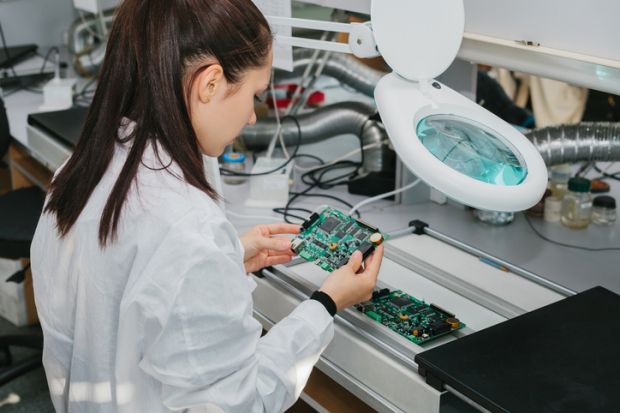When I became interested in science as a child, it didn’t really strike me that, as a girl, I might be in a minority. I was lucky to have open-minded parents and to be in a school where teachers supported diversity of interest, breaking down silos of “boys’” and “girls’” subjects.
Yet, over the years, the sense of being in a minority is increasingly apparent. Don’t get me wrong, having been educated in the 1980s and 1990s, I’ve always felt that I’ve been at the crest of a wave of encouragement, and I have been influenced and strongly supported by many male as well as female colleagues along the way. However, when I look around a lecture theatre of undergraduate engineers, or see statistics on career progression, I do question why diversity hasn’t improved more since I was studying physics in the 1990s.
Clearly there are many fantastic female role models in science and engineering who are inspiring girls and young women through engaging lectures; there are Women in Science and Engineering events and the like. There are also initiatives such as Athena SWAN, which is making a difference in many academic institutions.
Sadly however, most of my workdays are not spent listening to encouraging presentations or attending interesting networking events. Rather, within the routine activities that we academics attend to daily, I can find myself feeling that my own school, where I’ve worked for nearly 14 years, is not a place where I belong. Why? Well, because the examples used in everyday conversation, when discussing anything from notional students to interview candidates, or CEOs of industrial partners to principal investigators on projects, are more often than not, assumed to be male.
While awkward, I often feel that I have no choice but to interject with what sounds like a kind of snippy “or she?”. This is even more uncomfortable if I happen to be the only woman in the room – another common experience.
I don’t dispute that according to the stats, it is indeed more likely that these examples will be male – but reinforcing the sense of “this is not for you” to female students and staff is surely part of the problem. On a more positive note, in the past few years, some colleagues, male as well as female, are starting to add their own “or she?” to the conversation – and that feels like progress!
At an International Women in Engineering event held in my school at the University of Manchester this week, speakers stressed the importance of sharing experiences of these everyday, seemingly mundane moments that can chip away at one’s confidence in a role. There are many common experiences we share that we often write off as “just the way things are”. The problem, however, is that these things can undermine job satisfaction, career progression and a sense of worth and confidence.
However, the benefit of recognising that some of the problems are fairly mundane and commonplace means that they are also solvable with a few positive changes that can benefit colleagues irrespective of gender. Uncomfortable as it may sometimes be, challenging the small stuff can have impact, and for many colleagues, is pushing at an open door.
I do believe that there is much more than can be done to ensure that a science and engineering career is as attractive an option to our female students and young women at school and college as it is to their male counterparts, but getting started is only the first step. We must work hard to ensure that choosing a science and engineering career is one that can be sustained as the career and life path progresses – and for that I think we need to positively tackle the small stuff.
Alice Larkin is head of the School of Mechanical, Aerospace and Civil Engineering at the University of Manchester.
Register to continue
Why register?
- Registration is free and only takes a moment
- Once registered, you can read 3 articles a month
- Sign up for our newsletter
Subscribe
Or subscribe for unlimited access to:
- Unlimited access to news, views, insights & reviews
- Digital editions
- Digital access to THE’s university and college rankings analysis
Already registered or a current subscriber?









